Le Bureau de le Resistance has needed to take its operations underground.
The Stream will experience a hiatus of unknown duration.
Respect to all agents of the liberation.
Stay tuned & Peace Out.
Le Bureau de le Resistance has needed to take its operations underground.
The Stream will experience a hiatus of unknown duration.
Respect to all agents of the liberation.
Stay tuned & Peace Out.
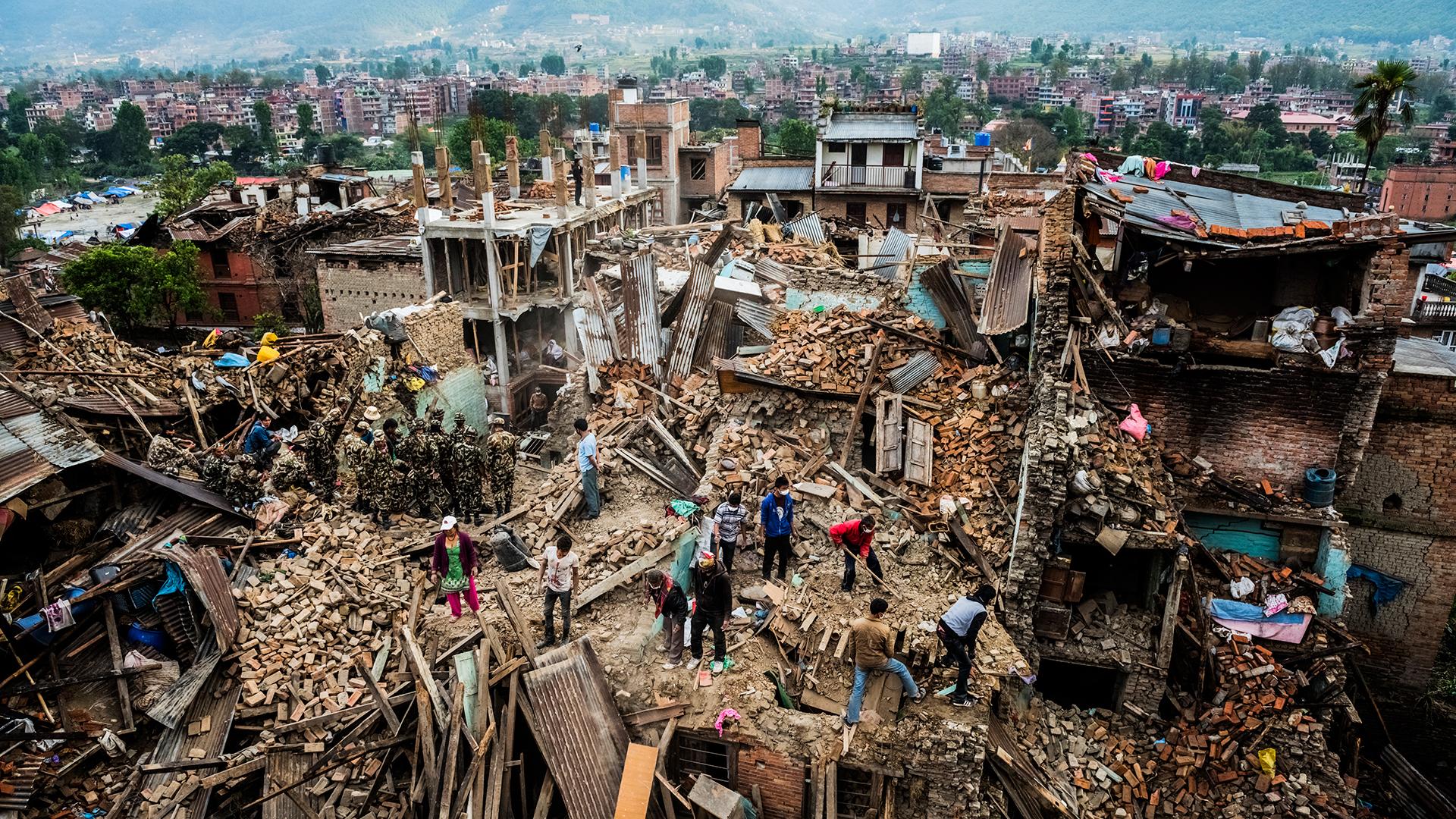 When a place is hit by a natural (or manmade) disaster, who gets out or gets taken care of and who gets left behind or has to fend for themselves? Perhaps unsurprisingly, the answer often has something to do with who has money.
When a place is hit by a natural (or manmade) disaster, who gets out or gets taken care of and who gets left behind or has to fend for themselves? Perhaps unsurprisingly, the answer often has something to do with who has money.
This article by Abe Streep explores the adrenalinised mission and ethical edges of Global Rescue, a subscription service for global adventurers who can pay for access to a fast exit in case of need. The story relates intense and uncomfortable events in the aftermath of the recent earthquake in Nepal, and offers both a microcosm and a metaphor of how global capitalism structures access to resources. It also offers an interesting glimmer of humanity in concluding with how the GR operative in Kathmandu subsequently left to set-up no-cost non-profit healthcare in Africa. Read the article >>
.
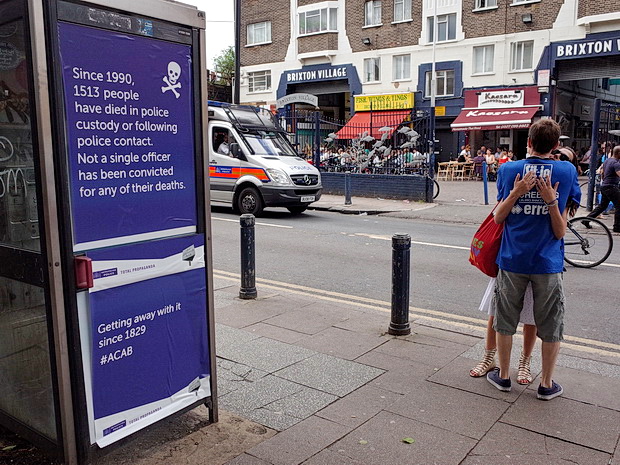 The London Metropolitan Police spends millions of pounds a year delivering its PR message to Londoners with, of course, a certain spin on the content. A team of unknown interventionists felt the Met’s communication was lacking factual balance and have been offering alternative perspectives… Read Mike Urban’s report and see more pictures >>
The London Metropolitan Police spends millions of pounds a year delivering its PR message to Londoners with, of course, a certain spin on the content. A team of unknown interventionists felt the Met’s communication was lacking factual balance and have been offering alternative perspectives… Read Mike Urban’s report and see more pictures >>
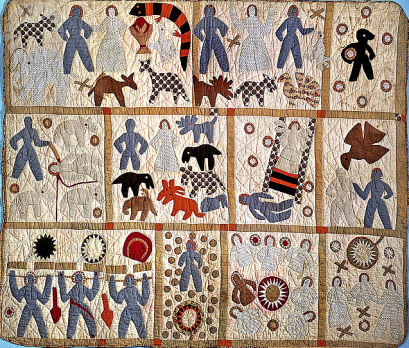
The notion of ‘biocultural rights’ goes beyond individual rights and private property to explicitly recognize a community’s identity, culture, governance system, spirituality and way of life as embedded in a specific landscape. It represents a bold new departure in human rights law that recognizes the importance of a community’s stewardship over lands and waters. The emerging movement for biocultural rights is woven from four main strands:
.
Read David Bollier’s short article “The Rise of Biocultural Rights” and dig deeper with the longer and more detailed proposal by Kabir Sanjay Bavikatte and Tom Bennett, Community Stewardship: the foundation of biocultural rights
Illustration (quilt) by Harriet Powers
The long-running tragic epic of Greece’s slide towards economic ruin and social breakdown is into its latest cyclical act. Commentators from across the traditional right-left political spectrum have described the Eurogroup deal forced on the Greeks as a ‘coup’ and ‘impossible’, but somehow the seemingly inevitable Grexit has been pushed back once again.
This interview with Greece’s radical (and now out of office) finance minister gives an insightful window into the secretive power dynamics at the heart of the Eurozone and international financial projects.
Read the transcript >>
.
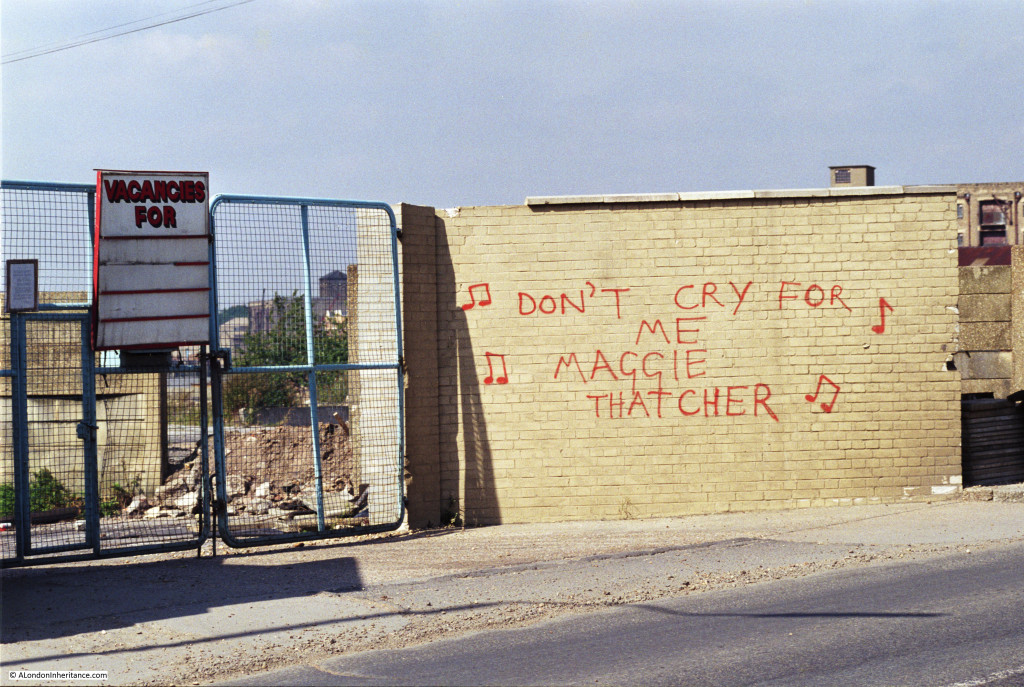 A London Inheritance is a photography blog exploring London’s vanished landscapes and forgotten communities. This post presents images from the 1980s on the eroding last traces and disappearing worlds of independent shops, hand-painted signs – and pre-“streetart” graffiti.
A London Inheritance is a photography blog exploring London’s vanished landscapes and forgotten communities. This post presents images from the 1980s on the eroding last traces and disappearing worlds of independent shops, hand-painted signs – and pre-“streetart” graffiti.
View the post >>
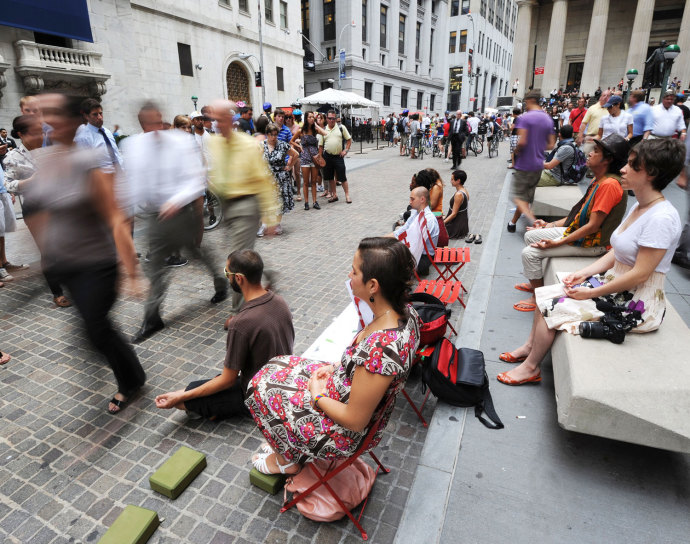 Buddhist meditation is rooted in the principle of cultivating non-attachment. But in recent years corporate culture has been adapting and assimilating the principles of mindfulness to use as mental tools to increase productivity. Michelle Goldberg explores the meeting of American capitalism and Eastern spirituality.
Buddhist meditation is rooted in the principle of cultivating non-attachment. But in recent years corporate culture has been adapting and assimilating the principles of mindfulness to use as mental tools to increase productivity. Michelle Goldberg explores the meeting of American capitalism and Eastern spirituality.
[Photograph by Stan Honda]
The Zen Master Shunryu Suzuki Roshi gives a playful teaching on meditating with sound as a pathway into deeper conscious connection of being.
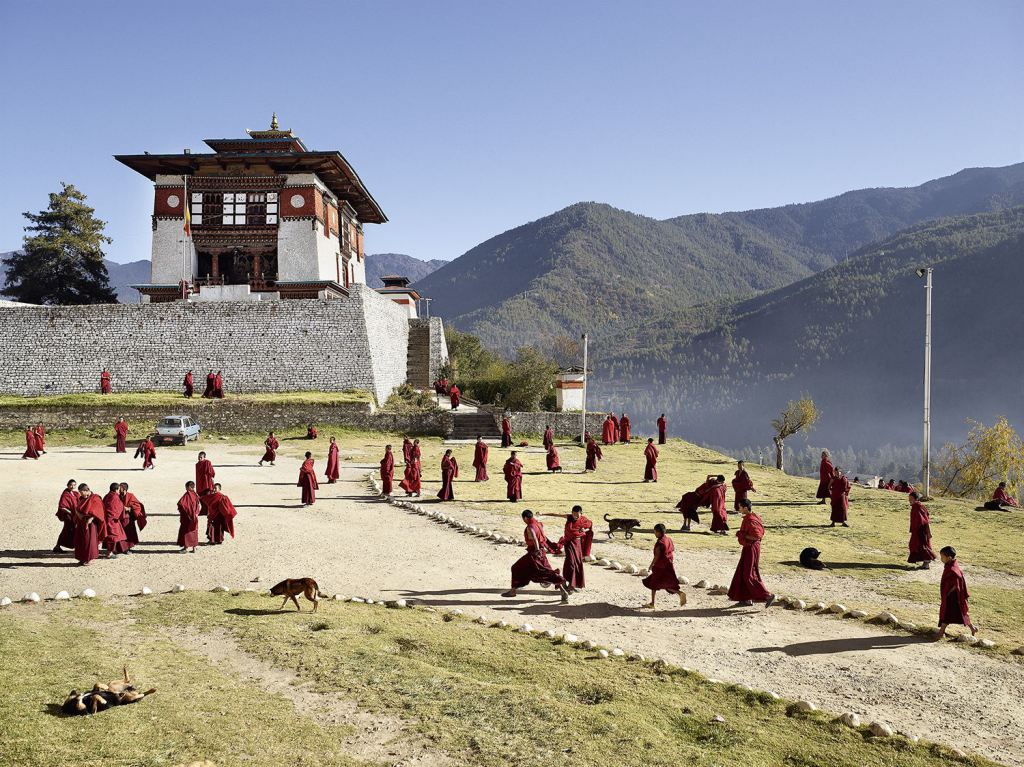 The exuberant cacophony of children’s shouts and the hubbub of games playing out – the school playground is a near-global example of both universality and difference.
The exuberant cacophony of children’s shouts and the hubbub of games playing out – the school playground is a near-global example of both universality and difference.
James Mollison began photographing children on break-time in Britain and became intrigued by the big differences he found, so took the project out internationally to create a remarkable document of cultural diversity and commonality.
Read an article about the project and see the full series here >>
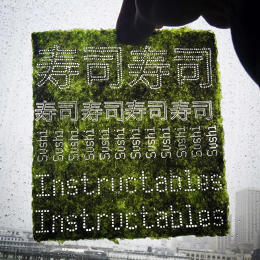 In past centuries, fortunate artists found patrons in the aristocracy or the church who would support their work. In the 20th century, art institutions and foundations stepped into this role with residency programs funded either by wealthy donors or by public donations. More recently, a new variety of artist-in-residence program has emerged, this time sponsored by big companies.
In past centuries, fortunate artists found patrons in the aristocracy or the church who would support their work. In the 20th century, art institutions and foundations stepped into this role with residency programs funded either by wealthy donors or by public donations. More recently, a new variety of artist-in-residence program has emerged, this time sponsored by big companies.
The software company Autodesk invites artists to spend up to six months working in their facilities, giving them a stipend and funds for their materials and using their work to support development. Amtrak gives writers-in-residence a free ride on their trains without any contractual obligation. In contrast, Facebook has its own quasi-secret artist-in-residence program which pays to create – and own – artwork that adorn the walls of its buildings.
Elizabeth Segran describes these evolving opportunities for artists, with a hovering question around what is really motivating companies to do this and what they expect in return for their sponsorship. Welcome to the brave new world of the corporate-sponsored artist…
Read more >>
[Image from the Salmon Skin LED light project]
Speaking in the late 1980s, Noam Chomsky offers a still highly-relevant and succint breakdown of the reality of democracy as practiced, or engineered, in most western liberal states.
The people of the United Kingdom today have the opportunity to vote for their next government. Some have suggested this election has precipitated further descent into apathy and cynicism and will confirm the end of the long-standing British two-party system of representative democracy.
A few postcards from beyond the polling booths…
George Monbiot makes a sharp critique of the political situation in Britain, arguing that the serious issues which really need addressing seem to be subject to a code of silence by most of the parties, in a kind of unspoken systemic complicity.
Photographer Denise Felkin went to meet some of the human beings behind the statistic that over a third of the registered electorate don’t vote. Her portrait series “I’m not voting because…” explores the social and political context for high abstention.
Attempting to mobilise these silent masses, the Vote or Vote None campaign encourages people to use their ballot paper to state that none of the candidates meet their approval. arguing that that this is the route to galvanising and renewing the political system.
A more tactile approach is taken by Samantha Moyo who urges all parties to Turn Up and Hold Hands – asking “Which politician is using the word love? Which politician is spending time in non-formal attire with the communities they wish to represent? Which politician is owning up to their mistakes?”
Meanwhile, Rupert Murdoch’s media minions appropriate the spirit of Marvin Gaye and Cassetteboy to jump on the election hype bandwagon… (to good effect, although we wouldn’t recommend believing; click play to view)
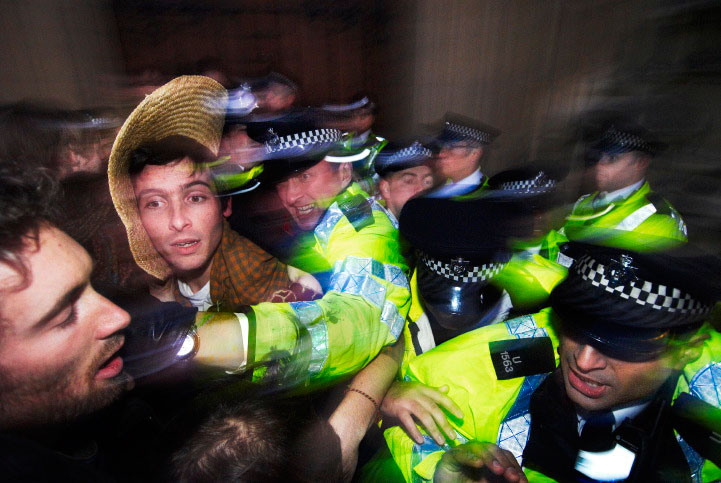 “Protest photography is much more than extreme street photography. Coverage of protest forms our social memory, it creates a permanent record for history, spreading the ideas behind the protest and fertilising social change.” says David Hoffman, co-founder and senior moderator of the EPUK photojournalists network.
“Protest photography is much more than extreme street photography. Coverage of protest forms our social memory, it creates a permanent record for history, spreading the ideas behind the protest and fertilising social change.” says David Hoffman, co-founder and senior moderator of the EPUK photojournalists network.
However, he continues, “there’s something very Zen about protest photography. Caught on the fly, seen and recorded in a fraction of a second, protest photographs are truths. Not an explanation of the truth. Not a commentary or an analysis.
This article explores the importance and the effect of protest photography – and the ways in which the state and the police attempt to neutralise and manipulate images of political dissidence.
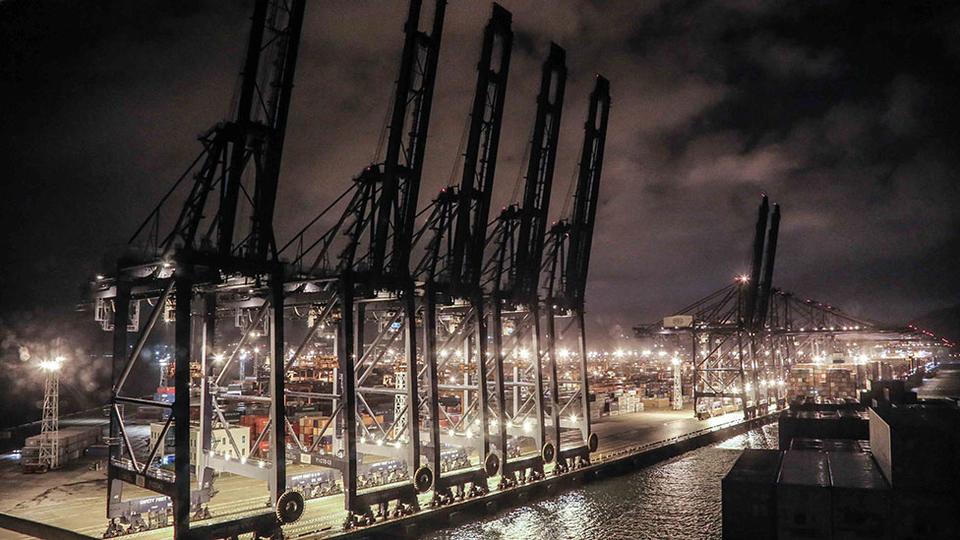 The inter-connected systems of global civilisation are now so vast and complex that we, as in we of the developed and growing western world, have no real idea what goes into making our consumption-based lifestyles possible.
The inter-connected systems of global civilisation are now so vast and complex that we, as in we of the developed and growing western world, have no real idea what goes into making our consumption-based lifestyles possible.
Tim Maughan and Unknown Fields took a journey into the ‘invisible network that keeps the world running’ and then kept going until they reached the place where the dream of technological liberation has brought a dystopian nightmare.
Click on the links above to read the articles and view slideshows, and watch the film here >>
Thought-provoking images of the direct and incidental effects of global overpopulation & overconsumption. Curated as part of The Guardian’s climate change awareness campaign.
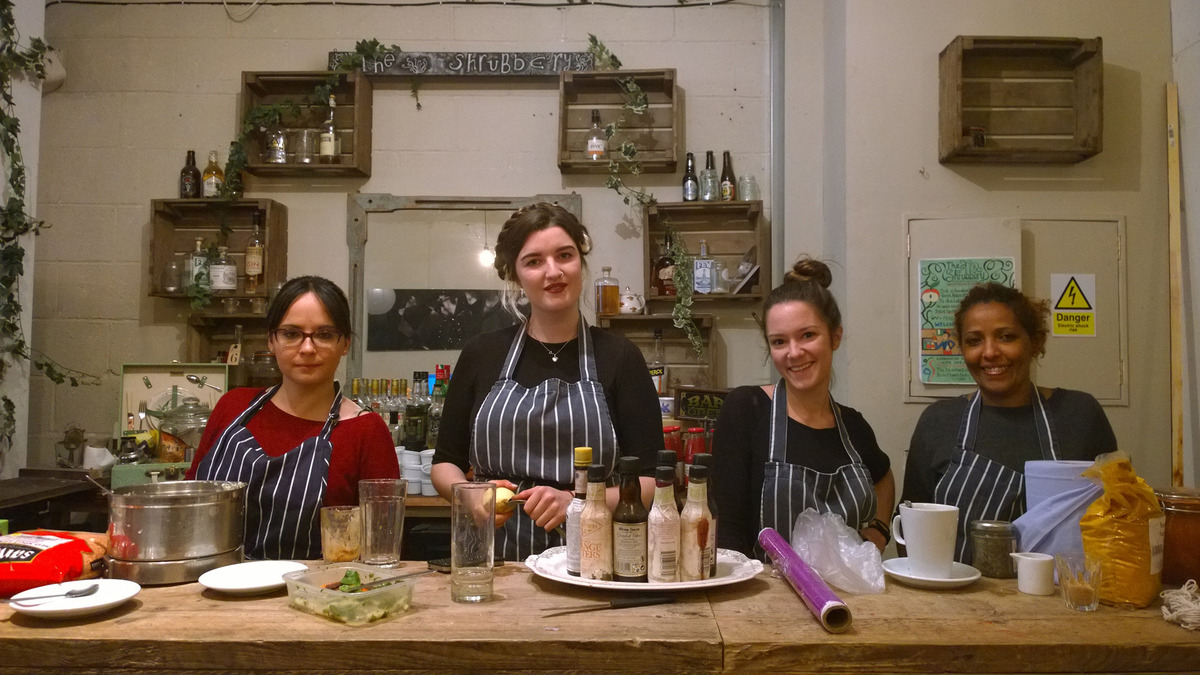 “Food is very powerful in terms of social change, because it has that ability to bring people together. It’s something that transcends all barriers — the universal language.” Nikandre Kopcke is the founder of a London-based pop-up restaurant collectively run by women from migrant and refugee communities.
“Food is very powerful in terms of social change, because it has that ability to bring people together. It’s something that transcends all barriers — the universal language.” Nikandre Kopcke is the founder of a London-based pop-up restaurant collectively run by women from migrant and refugee communities.
Mazí Mas has six women – all mothers – from six different countries currently working as part-time chefs while other women participate in a weekly training program, supporting them to adapt their skills to the restaurant industry while reducing their vulnerability to exploitation and their dependence on male partners.
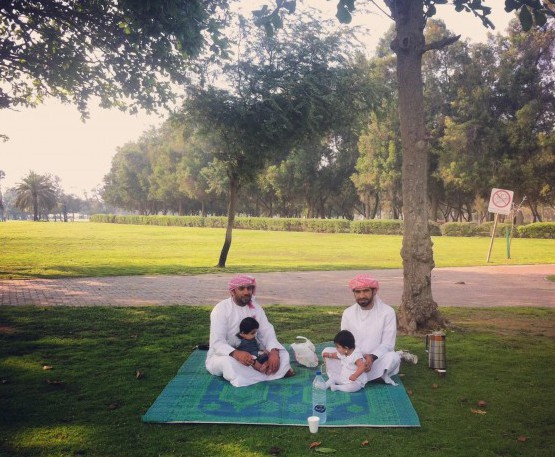 In the mainstream media, the phrase ‘The Middle East’ has become shorthand for conflict, destruction and fundamentalism.
In the mainstream media, the phrase ‘The Middle East’ has become shorthand for conflict, destruction and fundamentalism.
A group of photographers fed up with being commissioned to cover extreme people and situations, decided to collaborate on creating a forum for imagery showing life in Middle Eastern countries in a more ‘normal’ light.
The Instagram feed @everydaymiddleeast is the result. Founder Lindsay Mackenzie speaks about the story behind the collective and their vision. Read more >>
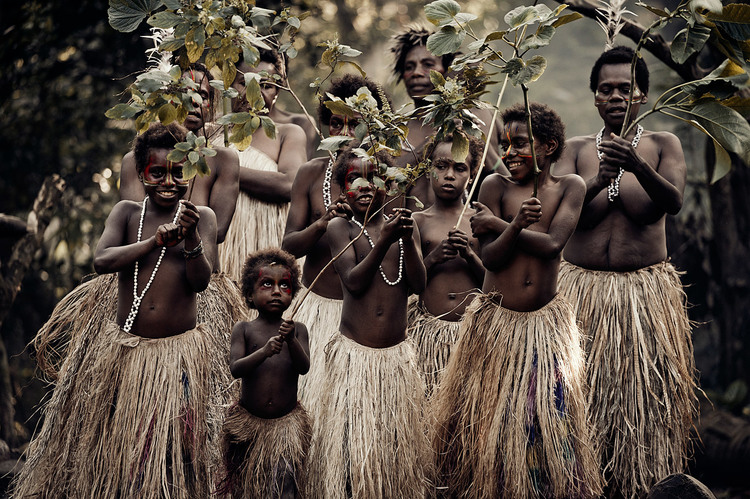 After becoming a new mother, Michelle Henning found herself looking for different models of parenting. This conversation with the photographer Jimmy Nelson explores some of the indigenous approaches to parenting that he found during his extensive travels documenting tribes all over the world. The two of them discuss the differences in approach- and philosophy – between many traditional cultures and the ways children tend to be raised in the modern western world, asking if there are lessons or inspirations for parents in the west.
After becoming a new mother, Michelle Henning found herself looking for different models of parenting. This conversation with the photographer Jimmy Nelson explores some of the indigenous approaches to parenting that he found during his extensive travels documenting tribes all over the world. The two of them discuss the differences in approach- and philosophy – between many traditional cultures and the ways children tend to be raised in the modern western world, asking if there are lessons or inspirations for parents in the west.
Read the article here >>
The conversation explores some of the terrain presented by the anthropologist Jean Liedloff in her seminal Continuum Concept, which was perhaps the first western parenting model to draw on indigenous ways .
Note that Jimmy Nelson’s work is not uncontroversial, his project Before They Pass Away having been criticised by indigenous leaders and advocates as idealised fantasy disconnected from the reality of indiegenous peoples and their contemporary situation.
Read more on this angle here >>
 “The people who are ditching their Kindles and savoring books as physical objects, brewing their own beer and resurrecting other old arts and crafts, reformatting their lives in the modes of a past decade, or spending their spare time reconnecting with the customs and technologies of an earlier time — these people aren’t doing any of those things out of some passion for self-denial. They’re doing them because these things bring them delights that the shoddy mass-produced lifestyles of the consumer economy can’t match.”
“The people who are ditching their Kindles and savoring books as physical objects, brewing their own beer and resurrecting other old arts and crafts, reformatting their lives in the modes of a past decade, or spending their spare time reconnecting with the customs and technologies of an earlier time — these people aren’t doing any of those things out of some passion for self-denial. They’re doing them because these things bring them delights that the shoddy mass-produced lifestyles of the consumer economy can’t match.”
For John Michael Greer, blogger, commentator on the disintegration of civilisation and Grand Archdruid of the Ancient Order of Druids in America, the way forward is not a ‘Butlerian jihad’ (a reference to the revolt against technology in Frank Herbert’s Dune) – but a Butlerian Carnival.
He argues we need a sensuous celebration of the living world, outside the cubicle farms and the glass screens, drawing raw materials from eras, technologies, and customs of the past which don’t require the extravagant energy and resource inputs that the modern consumer economy demands. Such a carnival way of life will be better suited to a future defined by scarce energy and resources… Read his full essay here >>>
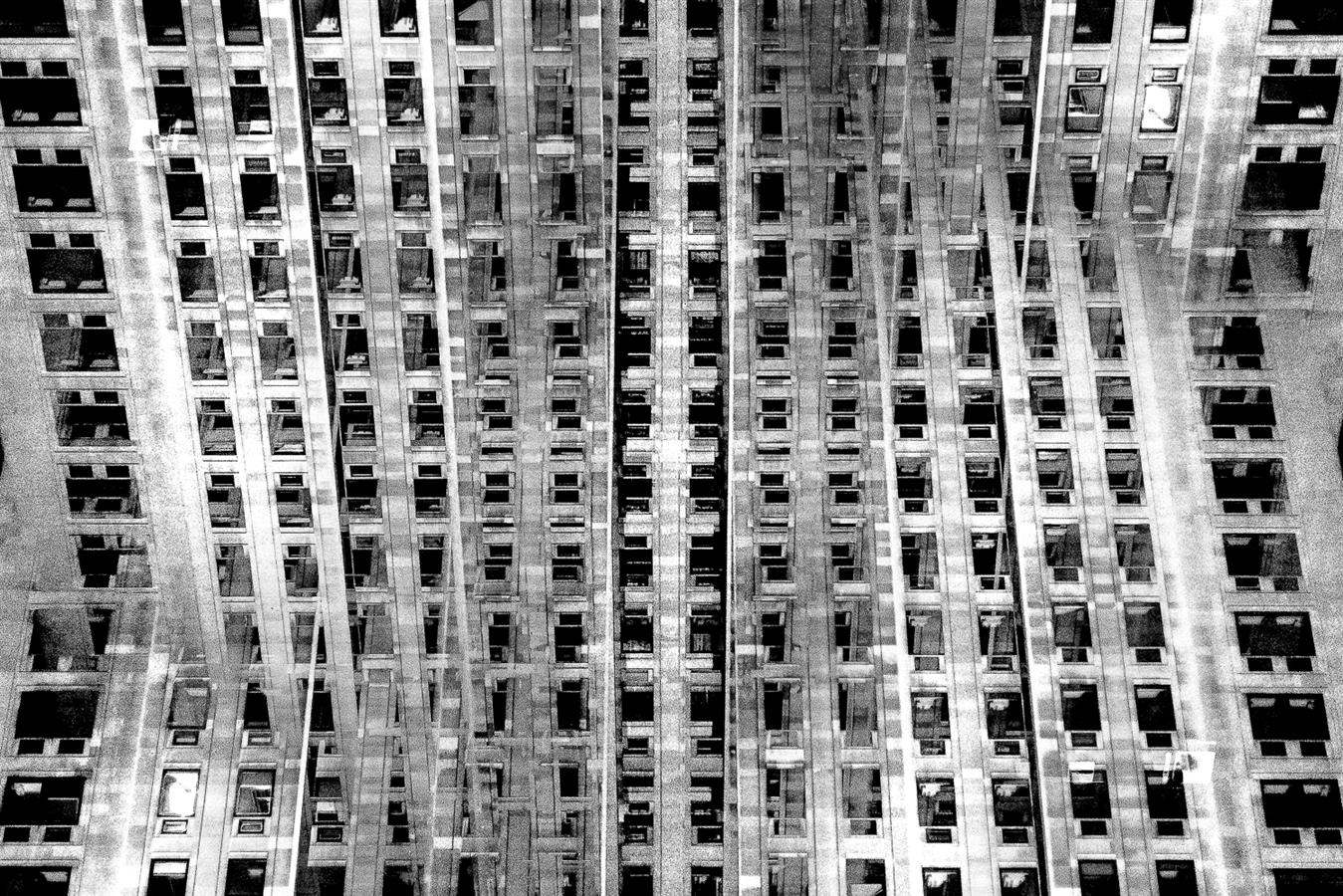 Lewis Bush uses photography to explore how capitalism applies the principle of ‘Stacking’ across contexts, from supermarket shelving to wealth-focused housing and the new architecture boom in the City of London.
Lewis Bush uses photography to explore how capitalism applies the principle of ‘Stacking’ across contexts, from supermarket shelving to wealth-focused housing and the new architecture boom in the City of London.
View the images >>